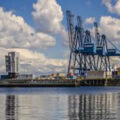Greenock, Scotland news and updates.
This post was provided by Newsnet.scot.
Equality Nation looks at the Common Travel Area between an independent Ireland, the nations of the UK and the three crown dependencies of Isle of Man and the Channel Islands.
We can all remember the gnashing of teeth, hand-wringing and crocodile tears, the assertions that family members would overnight become foreigners, and that heavily armed watch towers and miles of barbed wire fencing would be the norm at the Scotland/England border were the Scots to have the audacity, the gall to vote for independence in 2014. Five and a half years on and if a referendum is called this year, as our First Minister has indictaed is her intention, then can we expect a rerun of the same whiskery old stories?
In the intervening years England voted for Brexit but Scotland didn’t, but on 31st January this year we were dragged out anyway. In this phoney war period of transition, when many blinkered Brexiters crow that none of the dire projections of doom have befallen the UK, many businesses are relocating to the EU and jobs are being lost at an alarming rate while the pound continues its long-term decline against major currencies. To make matters worse chlorinated chicken and hormone fed beef hover on the horizon awhile leaked emails from senior government advisors say UK farming and fishing are not critically important.
As Westminster tinkered around with Brexit, a Memorandum of Understanding was signed by the UK and Irish Governments to place the Common Travel Area on a more secure footing after Brexit. This would help ensure no reappearance of watch towers and barbed wire on the Northern Ireland/Ireland border, the Good Friday Agreement having seen their disappearance after the years of troubles.
Since 1922 (so predating the EU by more than 50 years), when 26 of Ireland’s 32 counties left the UK to form an independent state, the Irish Free State, there has been a Common Travel Area (CTA) in place covering the UK and Ireland. The CTA was a way of retaining links with Ireland, where, as part of the UK, British immigration law had applied. The prospect of patrolling a porous and meandering 499km long land border meant the UK Home Office at the time was reluctant to impose passport and immigration controls between the new Irish state and Northern Ireland.

Much the same problem faced the UK Government during the recent Brexit negotiations with the EU and Ireland. These resulted in a border in the Irish Sea which is now seemingly being denied. However in 1922, if the existing position was to be retained then British immigration policy had to continue to be enforced by Irish immigration authorities. Nearly a century later it’s the EU that wants a level playing field over standards and conditions while the UK, minus Ireland, digs in its heels whilst it shuts the immigration door firmly in the faces of many EU nationals.
The Common Travel Area is an arrangement between the UK, the Crown Dependencies (Bailiwicks of Jersey and Guernsey and the Isle of Man) and Ireland brought about through cooperation between UK and Irish and other immigration authorities. It enables British and Irish citizens to move freely between, and reside in the UK and Ireland. So British and Irish citizens enjoy the right to work, study and access social welfare benefits and health services in both countries. The CTA also enshrines a reciprocal right for citizens to vote in local and national parliamentary elections.
Scotland is of course part of the CTA. But the 2014 (and ongoing) threats of passport controls and watch towers at the border suggested we would no longer be included within it come independence. Interesting therefore to note that the UK Government, even though determined on Brexit, was keen to retain the CTA. Neither the UK nor Ireland had joined Shengen, having received opt-outs, in order to retain the CTA.

The Common Travel Area Guidance issued by UK Government on 22nd February 2019 states: “British and Irish citizens enjoy additional rights in Ireland and the UK. These include the right to work, study and vote in certain elections, as well as to access social welfare benefits and health services.”
UK Government February 2019
An article on the website Cambridge Core states: “…the CTA is not as robust as is popularly imagined. First, limitations on free travel exist, depending on the direction of travel. Secondly, passport-free travel is not made available to all persons in either jurisdiction. It is worth noting in this context that the two states enforce each other’s conditions of entry, whenever non-nationals of either state seek to enter either jurisdiction with the intention of travelling on to the other, without qualifying for admission there.
“Notwithstanding these limitations, however, the CTA clearly results in considerable inconvenience being avoided by its beneficiaries. It is somewhat remarkable that there is no international treaty of any kind establishing the CTA.
“It [the CTA} has come about and operated without the benefit of any framework document outlining its objectives and features. Perhaps partly in consequence, it has largely escaped rigorous discussion or criticism by a general public which has largely taken it for granted, even while benefiting from its existence.”
So membership of the CTA is a political decision based on expediency, accepted without question by the UK public.
Although the CTA has, due to wars and troubles, waxed and waned in its operation over the decades, the UK has been determined to hang on to it. On 8th May 2019, Tánaiste Simon Coveney and UK Cabinet Office minister David Lidington signed a memorandum of understanding to secure the rights of Irish and British citizens post-Brexit by putting the rights of both countries’ citizens, that are already in place under the Common Travel Area, on a more secure footing. The agreement meant the rights of both countries’ citizens would be protected after Brexit while also ensuring that Ireland would continue to meet its obligations under EU law. It also meant citizens from Ireland and Northern Ireland could continue to move freely between the north and the south.
The Irish Government says of the reinvigorated CTA Agreement: ‘The CTA was recognised throughout the EU-UK negotiations and there is agreement in the Protocol on Ireland and Northern Ireland which is an integral part of the Withdrawal Agreement, on the basis of which the UK left the European Union on 31 January 2020, that Ireland and the UK may …‘continue to make arrangements between themselves relating to the movement of persons between their territories’”.

The CTA required a number of opt-outs from EU protocols, and although it’s often said that the EU will not allow any opt-outs to an independent Scotland applying for membership, given the historic nature of the CTA, and given that the nations of the UK and Ireland inhabit two islands on the north-western edge of the continent of Europe, it would seem odd for the EU to agree post Brexit to a continuance of the UK/Ireland CTA but not to allow an independent Scotland to remain within it. It would be especially odd as it has said the UK (including Scotland) could: “continue to make arrangements between themselves relating to the movement of persons between their territories”. It could also be expected, with the close relationships between Ireland and Scotland, that Ireland would be in favour of Scotland remaining within the CTA.
The UK Government has been keen to maintain a common travel area with Ireland (now an independent country within the EU) after Brexit, therefore it makes little sense for it to deny a retention of membership to an independent Scotland – unless through spite and vindictiveness. So Scottish and English citizens should be able to pass freely across the border, to work, shop in Berwick or Carlisle, or visit friends, though the position may differ for goods if Scotland rejoins the EU. As for family members becoming foreigners, well it was England that voted for that, and the Tory Government at Westminster have split and made foreigners of many family members who have lived, worked, paid taxes, raised children and contributed to communities and society in Scotland.
If we see watchtowers being erected at the border we know it’s Westminster that hasn’t been listening and which has decided on the spite and vindictiveness route which will only be detrimental to people living in isolated England, as independence will, as Bill Austen says in the Common Weal podcast, bring many positive opportunities for Scotland.
You can find similar content on our blog: https://thaimassagegreenock.co.uk/blog/
Please let me have your feedback below in the comments section.
Thai Massage Newsletter
To make sure you don’t miss out on any new posts or promotions that we introduce, sign up for our newsletter.
Once a month we run a special promotion for our newsletter members, so sign up now to make sure you don’t miss out.
It’s free and full of great health and nutrition tips and advice on how we can help you achieve your health and fitness goals.
Let us know what topics we should cover in future.





